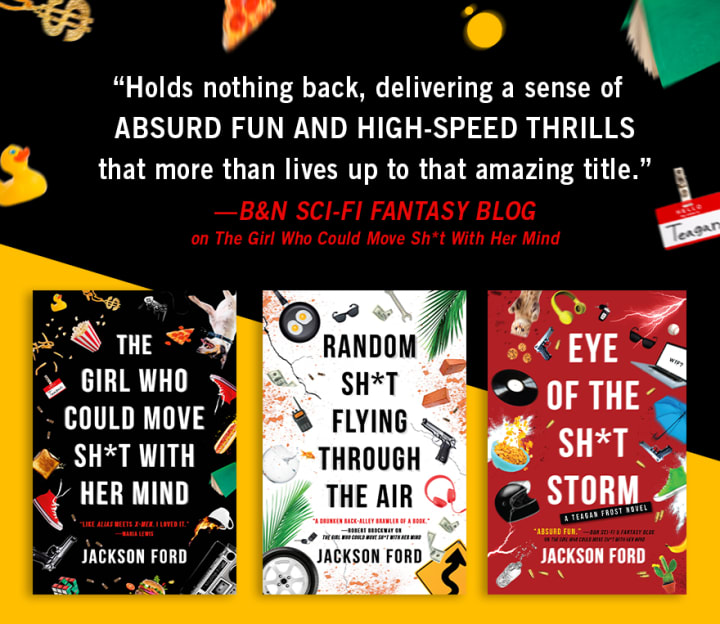Is the Frost Files Racist?
I knew it was a risk calling a black character Africa. I did it anyway.

Africa, if you haven’t read the Frost Files books (and why the hell not?) is a Senegalese immigrant, living homeless on the streets of Los Angeles. He is seven feet tall, rake thin, and has a voice that can be heard from space.
He is also desperately ambitious, more intelligent than he looks, and has a million mostly-true stories. He adores Teagan (the main character), has saved her ass multiple times, and has also completely abandoned her to go off on his own missions. He’s that kind of dude.
Generally, my readers LOVE Africa—real name Idriss Kouame. But more than a few of them have asked what the hell I was thinking when I gave him that nickname.
Not one of them—not a single one—got the joke.
Because here’s the thing. I am African. I was born in South Africa, and lived there for a good 20 years. I have a fancy green passport, and I can speak isiZulu. So I am, let us say, more aware than most of how African citizens are treated in first world countries. I may be a white dude, living life on easy mode, but that doesn't mean I'm ignorant of how people in the US, UK, Canada and Australia view Africans in general.
And one of the things that happens over and over and over again is that people from first world countries think that Africa is a country.
It's actually become a running joke: talking about going “back to Africa” to endless references to “African” music and “African” food. If you don’t believe me, try this. It's become such a punchline that there is even a culture and politics site called Africa Is A Country—and damn good it is, too.
(Side note: how many outraged emails do you think they get from fellow Africans claiming they are being reductive, and who do not understand irony? Hint: a LOT).
Naming Idriss Kouame Africa was all about poking fun at this. A big homeless dude with a strange accent, on the streets of a major American city? OF COURSE he’d be called Africa.
And flirting with disaster by naming characters after continents is only the tip of this particular iceberg. The Frost Files takes place in present-day Los Angeles, and you can't wander around there for very long without actually encountering race and racial issues. In the third book, Eye of the Sh*t Storm, I slammed headlong into them
I hardly need point it out, but 2020 was one of the most important, relevant years for black people in America since the civil rights movement. When I started writing Eye of the Sh*t Storm, in late 2019, I had no idea that was going to be the case. While I had some inkling that the story would touch on American racial politics, I certainly didn’t plan to write about them in this particular year.
If you’ve finished the book, and I certainly hope you have, you’ll know that it not only dealt with racial politics, but it tackled the subject head-on. Now for the total avoidance of doubt, I am not black, or American. I’m a white South African–living in Canada, for God’s sake! It’s very reasonable to ask: what earthly business do I have writing about the black American experience in the 21st century?
The obvious answer is, none at all. And yet, here we are.
One thing I absolutely loathe is when authors use the acknowledgements section in their books to formally apologise for any errors. “Before we go on, I’d like to open with an apology in case I offended anyone”. Bruh, shut up. Your job is to put the work in, to do enough research and talk to enough people that your story accurately reflects the communities you’re writing about. If people are offended, that’s their business, not yours. As long as you’ve done the work, you have nothing to apologise for.
That said, what I’ve written about may require a little explanation. If I’m going to write about these topics, I’d better be able to come up with a good reason why. I don’t think that’s asking too much. By the way, it goes without saying that there are major spoilers from here on out. If you haven’t read the book yet, I’d invite you to turn to page one, grab yourself a bourbon and a stogie, and settle in for a wild ride.
So.

If I’m doing my job, as an author, then my characters will surprise me. I generally have a good idea of what they are going to do in most circumstances—with Teagan, it’s probably something to do with food— but I’m always prepared for them to go in different directions. While I was writing this, Nic Delacourt took me down a deeply unexpected path.
I knew that the team were going to return to Dodger Stadium. I also had an idea that Africa was going to intercept them, and that he and Teagan would go at it. What I didn’t anticipate was Nic deciding to step up. I had no idea that he was going to insert himself into the conversation until it actually happened. Suddenly, there he was, thundering into battle with the full might of the US constitution behind him.
It was wonderful to write. I have no love for lawyers, God only knows, but one in full oratory is great fun to watch. There’s something about the language that really speaks to me. And of course, the situation still turned into a giant clusterfuck. It was always going to. But I finished writing that particular chapter with deep satisfaction, knowing that Nic had surprised me, which meant he would surprise the hell out of the reader.
In the aftermath of that particular confrontation, Teagan gave her former crush hell. I could see that coming from a mile away. I could see how she would tell him that he had no idea about the world she lived in, how she was outside the law, how they couldn’t depend on piddly little things like the US constitution to help them.
And it was at this point that I ran headlong into a concrete wall. Because what I had here was an uneducated white woman telling a qualified black lawyer that he had no idea what it was like to live unprotected by the law, in the United States of America.
As the old dog would say: ruh roh.
I have never been so flummoxed in my writing career. Because what the hell was I supposed to do? Sure, I could walk things back, take things down a different path and give Nic a more minor role in the stadium confrontation. But that would be betraying him as a character, in a way that I felt deeply uncomfortable about. Of course, I could simply have Teagan not take him to task…but that would amount to the same thing. I had not so much written myself into a corner as barricaded myself in one.
It was my wife who provided the solution, as she normally does. She listened to my concerned bleating, and told me to tackle things head on. She told me not to be scared of this, to do the work, and actually make this an issue in the book itself. As with so many things, she was right.
(Although, for the record, my dear, you are dead wrong about the creepy metal bird statue/art object you insist on having in our house. That thing is possessed by evil spirits. I swear, I sometimes see it move on its own).
I wasn’t worried about offending people, necessarily. The chances of avoiding that completely was slim to none, no matter what I did. What I didn’t want to do was be a total asshole. I wanted to look myself in the mirror and know that I’d done everything I could to get this particular book to a certain standard, in terms of dealing with race. If nothing else, I thought I owed my readers that much. Not to mention the community I happened to be writing about.
In the book world, it’s possible to hire a person known as a diversity reader: someone from a particular minority group who evaluates a manuscript that deals with cultures, ethnicities, and sexual orientations that are different to those of the writer. I’ve gone on record in the past as seriously doubtful of their usefulness, mostly because I am a total buffoon sometimes. I am very happy to state that I was wrong. I don’t think anybody has ever needed a diversity reader more than I needed one with this book. Fortunately, I had Nia Howard to help me out. She cast her eye over the relevant sections of the book, and was both candid and kind in her assessment. I’m deeply grateful to her, and to Quiet House Editing.
And by the way, I certainly don’t intend to hide behind her if I still managed to screw the pooch. I may be unapologetic at this point, but if it turns out that I messed up, that’s on me, not on Nia.
I also want to be clear that I don’t deserve a medal for doing any of this. It’s my job. It is, arguably, the bare minimum.
So there you have it. I didn’t intend to tackle racial politics head-on, but I blundered into the topic nonetheless. I hope I dealt with it in a sensible and thoughtful way. If it turns out I haven’t, I hope you’ll write and tell me. And I hope, whatever your opinions of my take on the black American experience as a South African Jewish white boy, that you enjoyed the book. Please remember to leave a review wherever you bought it. They all help.
----------------------------------------------------------------------------------------
This article comes directly from my weekly newsletter, Sh*t Just Got Interesting.
Want to read stories like it a week before anyone else? Sign up here. And you get a free audiobook too, which is nice.
About the Creator
Jackson Ford
Author (he/him). I write The Frost Files. Sometimes Rob Boffard. Always unfuckwittable. Major potty mouth. A SH*TLOAD OF CRAZY POWERS out now!






Comments
There are no comments for this story
Be the first to respond and start the conversation.